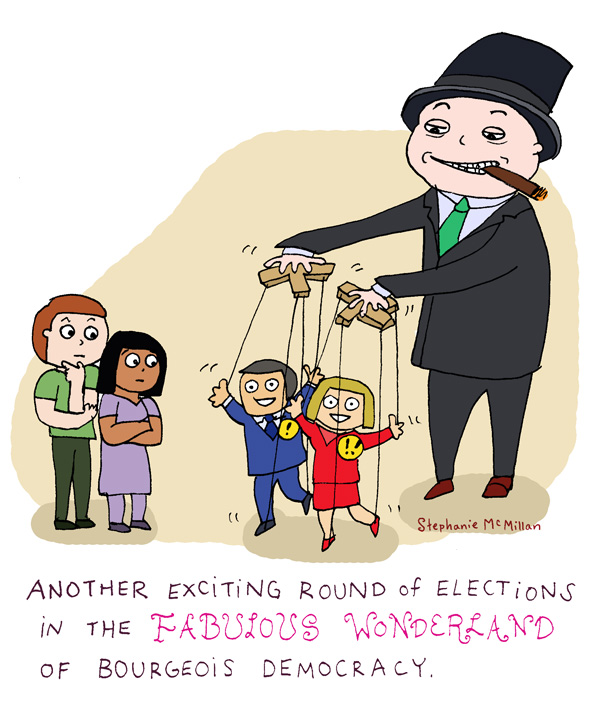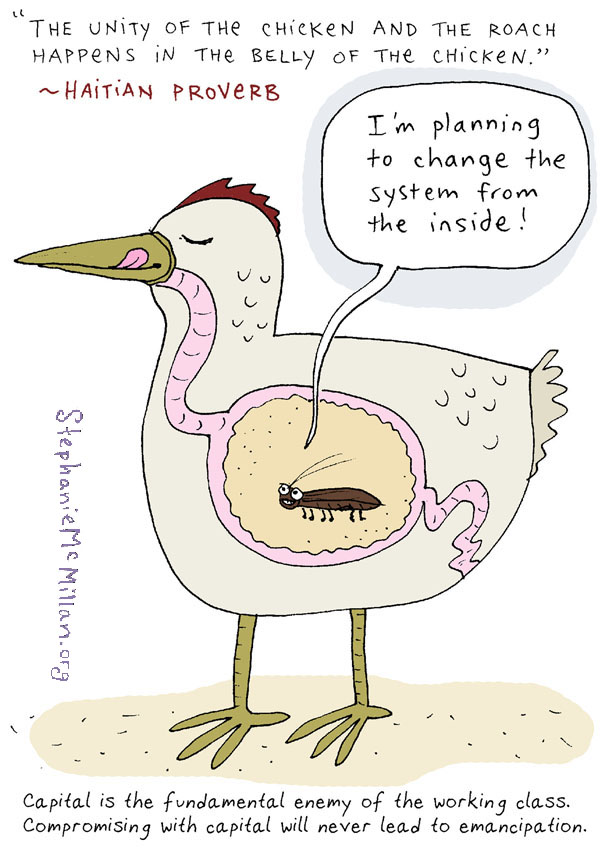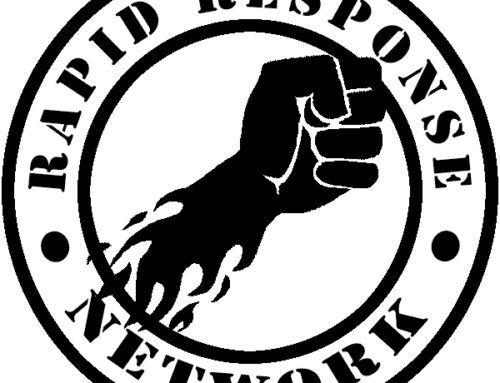We’re re-posting this 2014 OS piece on elections. It’s dated, so it doesn’t address the current election cycle/ring & circus, but is still relevant as it focuses on the re-cycled general arguments, used over and over, to validate bourgeois elections.
A “corrupted” system?
There’s a misconception by Americans that the problem with elected representatives today is that they’re ‘corrupt’ and that the whole political system is corrupt, rigged, and/or broken. The job approval rating for Congress reached an all-time record low of 9% according to a November 2013 Gallup poll. In total, there is a strong dissatisfaction with elected policymakers in Washington D.C.
Is corruption rampant in the nation’s capital? Is the electoral and political system in the United States broken? The truth is that the system works perfectly fine since it was designed this way – to serve the interests of the ruling class. Laws are written by the upper echelons to serve their interests and not yours.
Bourgeois Democracy & Democratic Rights
Capitalist ideology has trained us to think of democracy as an objective concept, with the potential to function in our interests, if we can just elect the correct candidates to represent us. The reality is that in any class divided society, democracy benefits the class in power. Democracy reinforces their power/dictatorship. Bourgeois democracy is set up for the capitalist class, and its different fractions, to organize themselves, settle differences, and maintain the disorganization of the masses. It’s also important to differentiate bourgeois democracy from democratic rights. Democratic rights are not democracy. They are concessions to the masses, made by the capitalist class to maintain their domination. Yes, we have made some immediate gains under capitalism – integration, the eight hour work day – but the ultimate role these concessions play is to reinforce and strengthen capitalism. Note that these concessions are rarely made through voting, but through struggle and people organized as a social force.
Your representative is banking!
Being elected into office is a post that brings power, prestige and all the trappings that come with being a Washington insider. According to the Center for Responsive Politics, analyzed reports from personal financial disclosure records show that for the first time, more than half of the 534 current members of Congress had an average net worth of $1 million or more. 268 to be exact. The report shows that the median for a congressional Democrat is $1.04 million and for Republicans, $1 million even. In short, politicians -your ‘representatives’ – are banking. Ask yourself, why would a millionaire politician care about me? The voting booth is essentially a springboard to wealth and power.
The report breaks it down even further. The median net worth for all House members was $896,000 and for Senators $2.5 million. A politician’s net worth is measured by adding significant assets (corporate bonds and stocks) and subtracting them from major liabilities, such as property mortgages, credit card debt, loans, etc.
One method of acquiring wealth as a politician is insider trading. According to a 60 Minutes report, many elected representatives leave their post with more money in their pockets than when they first arrived (some don’t ever leave their post). This is because politicians are Washington insiders that have daily access to nonpublic market moving information before it reaches the public. This gives them opportunities to trade on it. Lawmakers get a pass on insider trading because these laws are written in such a way that they don’t apply to themselves. This practice is common in Washington, Republicans and Democrats alike. You can find more detailed information about this by watching the 60 minutes report below:
In short, there’s very little corruption within the Washington elite since their actions are perfectly legal. If a practice is legal, then it wouldn’t be corrupt or dishonest to practice it.
The lesser of two evils
The notion of the lesser of two evils is constantly used to justify voting for a Republican or Democratic candidate. Consider Obama’s presidency.
In 2008, the economy was in freefall, millions of Americans were losing homes and jobs, and the United States was engaged in two wars in Iraq and Afghanistan. Could a Democratic President fix the damage done by a Republican President, surrounded by hawkish neocons? Fast-forward into 2014 and we see that this hasn’t been the case.
The Obama administration has escalated involvement in Afghanistan, expanded the war on terror through the use of Drones in Pakistan, Yemen, and Africa, – even assassinating American citizens without due process. Domestically, millions of immigrant families have been torn apart through deportations. The number of deportations have exceeded that of previous administrations (Yet somehow the Democratic Party has won Hispanic voters?)
This past December, the President signed a multi-year Farm bill law, which would cut the Supplemental Nutrition Assistance Program (SNAP) by $900 million a year over the next ten years! These cuts are devastating to the 47 million Americans that depend on it. As a result, a household of three lost $29 in food aid per month, leaving each person to spend an average of $1.40 per meal.
Let’s not forget to mention secret trade negotiations (trans-pacific partnership) that can have a disastrous impact on workers and the environment and a pro-fracking energy policy that can exacerbate climate change.
Sequestration (aka austerity) is eviscerating working families, students – drowning in debt – are entering a puny job market, and abroad, neoliberalism and imperialism are having devastating consequences.
Again, all of this under the lesser evil.
Evil is evil.
How about third parties?
Many are looking at third parties as a solution to our problems. A ‘first past the post’ voting model has left the American electorate no incentive to vote for any candidate other than those from the two dominant parties because they believe they are wasting their vote. This is not untrue, in first past the post voting all losing parties receive no representation regardless of the ratio of the voting turnout. This means that beyond making a third party vote a risky bet, the system actually works against smaller parties by making marginal political gains all but unattainable. Furthermore, any political influence gained by a third party almost always comes at the expense of the larger party with which the third party has the most political unity.
This means that one slice of the political spectrum is essentially forced to cannibalize its own electorate just to be able to compete in entry level politics with a third party. Our first past the post voting model is, by design, facilitating a two-party monopoly over our political system that forces the electorate to see-saw between two entrenched, self-interested parties. Once again we find that the system leaves the American voter powerless, not because it is broken, but because it is functioning exactly as designed.
Changing the system from within
What is the alternative then? Some will say that third parties are the answer and changing the system from within is our best hope of bringing change.
There is a Haitian proverb that says, “The unity of the chicken and the roach takes place in the belly of the chicken.” If we’re thinking about relation of forces, we are weak and disorganized at this point in time. Engaging in elections, or changing the system from within, means compromising with capitalism/capitalists and working on their terms. This will always result in us being absorbed by the system, working for their interests.
There is so much capital invested in local, gubernatorial, and presidential elections that it’s impossible for these third parties to rise to the top. Consider this, it costed $2 billion to win the 2012 presidential election. In total, at least $4.2 billion was spent on the 2012 congressional and presidential races.
Let’s remember that President Obama did run on a platform of change. This change was by no means radical but it was ambitious and daring. Revamping the health care system in the U.S was an ambitious campaign promise that has been met with many shortcomings. Changing the climate and culture in Washington never happened. Guantanamo remains open. Is it possible that a young and ambitious Senator from Chicago -an outsider to the Washington elite – that ran on the promise of “change you can believe in” could have been our best chance of changing the system from within?
Some argue that overturning Citizens United (a Supreme Court ruling allowing corporations to donate endless amounts to candidates) will bring back our democracy. Concerned voters and activists shout that money must be taken out of politics.
Edward McClellan, a writer for Salon Magazine, writes that inequality is one the nation’s founding principles, evident through the life and career of George Washington, America’s forefather. Washington – leader of a bourgeois revolution and the richest man to hold the presidency- had a vision of an economic system in which ‘man enriches himself by skimming off the excess value of his underlings’ work. Washington built his fortune on the backs of his 277 slaves, enabling him to ascend to Commander-in-Chief and the first American President. Washington’s model has been emulated by capitalists such as Sam Walton – the founder of Walmart. By paying his employees the lowest wages, Sam Walton was able to make a fortune and build an empire. The Walmart brand now leads the industry. Other corporations are trying to compete, slashing wages and exploiting workers to the last drop.
Validating the capitalist system.
Capitalism cannot be reformed into a just system; it must radically change. This will not be accomplished by voting. To believe in voting as a real power or act that actually serves the interests of the masses, validates and maintains a political-economic system built on the exploitation of workers and the environment. This belief maintains the forces of neoliberalism that continue to sweep through the developing world, including pockets of indigenous territories.
Nothing is black and white, however. For example, it’s understood that a person with MS might want to vote for the legalization of marijuana. We are not shunning people for these actions. It is not the action of voting itself, but the belief in the power of the vote to bring the radical transformation that society needs, that is the problem. Sure, vote for some immediate gain you may need. But we must understand that any concession made by the capitalist class will ultimately play out in their interests. Because marijuana legalization takes place under capitalism, it will look like any other industry seeking to expand markets and maximize profits. If you can afford organic, then you can purchase it. If not, then you will likely consume a product laden with cancer-causing pesticides.
Trying to work with the capitalist system is not the solution and using the system’s tool to defeat it is laughable. The voting booth is a state-sponsored form of dissent. In the words of Emma Goldman, “if voting changed anything, they’d make it illegal”.
The solution
Simply not voting is not enough. If we want to envision a true democracy, we have to practice it every day. Democracy cannot be a ritual you perform every two-to-four years. It starts in your community and starts right now. We have to struggle towards a democracy in the interests of the masses.
We are living in troubling times and the political climate is toxic and divisive. The American people have been divided and conquered, thanks to sideshows and trivialities by the mainstream media. Many Americans from the same economic class are blaming one another for our problems. Immigrants and the indignant have become scapegoats. Economic inequality between the rich and poor have reach unprecedented levels in American and across the globe.
We have to organize in our communities and gradually build a combative mass movement to end inequality once and for all and form a more just and classless society. We have to support workers in their struggles to end wage theft and exploitation. We must identify the various forms the capitalist class keeps us suppressed, including voting booths and reformist tools like non-profits.
In short, our representatives can’t represent us. The only people that can represent us are ourselves.





Why did you stop short of advocating proletarian revolution?